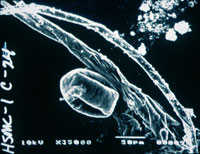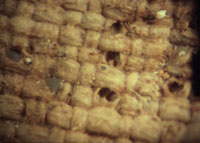Fiber Fossil Analysis

An extremely high magnification of fiber fossils found in the corrosion of copper shroud pins. Each fiber represents a single strand of flaxen linen.
Along with textile fragments, a copper pin was discovered inside the small coffin. The staff at HSMC discovered that fiber analysis could be performed on copper pins to identify the types of cloth used in burials. Often called shroud pins due to their association with those who have been laid to rest, these implements would secure grave clothes around the deceased. In most cases, textiles are rarely recovered from archaeological sites due to their rapid deterioration over time. Thus, shroud pins are closely examined with the aid of a scanning electron microscope to detect the presence of preserved fibers within the corroded remains of the copper pins. Research has shown that copper alloy minerals and corrosion products are toxic to micro-organisms, so decay of associated organic materials such as the textile fibers, will be inhibited. Through this analysis, it was discovered that the person interred in the smallest coffin had been wrapped in a cloth made of linen.

A magnified image of preserved weave showing that the fabric used for the burial shroud was of a linen weave.


